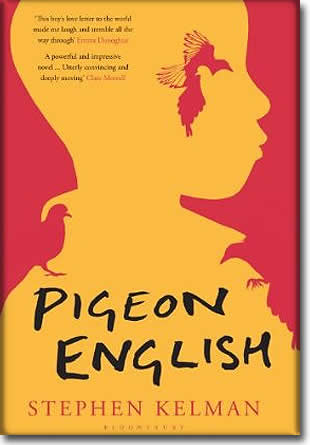 Reading the Longlist:
Reading the Longlist:
Punched in the Gut
Pigeon English
by Stephen Kelman
Review by Benjamin Craig
Harri, the eleven-year-old protagonist of Pigeon English, has recently emigrated to London with most of his family. (Back in Ghana, Harri's dad and his youngest sister, who is unwell for a good chunk of the book from an unidentified, sinister-seeming illness, are working toward joining them.) The novel's narrative voice is Harri's—a voice pastiched from an apparent Ghanese immigrant dialect, a regional London dialect, and an adolescent boy's penchant for literalizing idiomatic expressions. This results in a foreboding sense that Kelman is appropriating far too much, albeit skillfully. At times the prose gets away from him and I found myself wondering if, in an attempt to work with all these language influences, he wasn't making the character come off as, well, a little stupid—which is tricky territory when you're writing from the perspective of someone whose skin color is not the same as your own. It was hard, for most of the reading, to let go of the feeling that if he weren't careful, Kelman was in danger of being offensive and unfair to his characters and the real-world people they represented.
As the book progressed, however, I let go of it. Harri is easy to get behind. He is curious and naïve, precocious and empathetic. He sees the world in ways I suspect most children don't actually see the world. He muses, for instance, on the incongruity of a potted tree growing indoors and its inability to reach its potential—how it must feel, unable to spread its roots. The metaphors run thick in Harri's inner narrative, even if he doesn't appear to understand them, and Kelman does a lot of winking throughout.
The world the novel inhabits is dangerous for kids, and this danger is always imminent. Harri and his friend Dean are “investigating” the murder of another child that occurs in the first chapter. They mimic the detectives of the television show "CSI," taking fingerprints and interviewing suspects, but they are much closer to the actual bad guys than they realize, and far more vulnerable than they think. At the risk of spoiling things—the end of this novel shouldn't be shocking, but it is. Kelman has done something difficult here. I began reading and felt pulled out of the narrative while working out my feelings about cultural appropriation and racial stereotyping, but that fell away and I became well and truly invested. Then I got punched in the gut. Ω
Benjamin Craig is a managing editor at the magazine.


